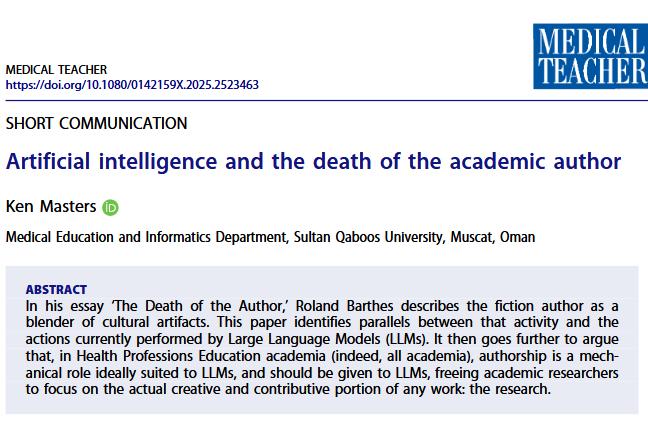
Ken Masters
@itmeded
Associate Prof., Medical Informatics; AMEE TEL Committee; Ed Boards: Medical Teacher, MedEdPublish. Views are my own.
Thought-provoking stuff. Well written.
Knowledge Is Dead by @JohnNosta | Emerging reality in the AI era •Knowledge as fixed structure is collapsing •LLMs don’t retrieve answers, they generate meaning in context, reshaping how we think. •Thought is not static, it’s navigational, emergent, and powerfully dynamic.…
Is your curriculum GenAI-proof? This #MedEdPublish journal article introduces a practical impact assessment method for #GenAI in health professions education featuring a case study for real-world application. 🔗 ow.ly/Zal550WwbmK #AIinMedicine #CurriculumInnovation
Really liking this self-study feature of OpenAI. Will produce images, tests, mark test... teachers really need to look at this....
Yes! My highest and best cognitive function is as an #idea factory, not wordsmith. A monkey (or #AI/#machinelearning) can write grammatically given sufficient training (but a human editor is still a value-add).
In an age of GenAI, is the Academic Author dead? Should we focus on research and leave the writing to the AI? A future in which: “We research; GenAI writes” #MedEd #HPE See my just-published: “AI and the Death of the Academic Author.” doi.org/10.1080/014215…
RIS is a convenient format to export thousands of research papers from databases in minutes. Very helpful for literature reivews. But many academics don't know about it. This thread will show you how to export papers from databases like Web of Science, Scopus, and others:
A thought-provoking paper: Academic writing is the least creative part of research. Trying to detect AI authorship is a losing game. Who writes the paper doesn’t matter, only who did the research does. The death of the academic author is the rebirth of the researcher.
In an age of GenAI, is the Academic Author dead? Should we focus on research and leave the writing to the AI? A future in which: “We research; GenAI writes” #MedEd #HPE See my just-published: “AI and the Death of the Academic Author.” doi.org/10.1080/014215…
In an age of GenAI, is the Academic Author dead? Should we focus on research and leave the writing to the AI? A future in which: “We research; GenAI writes” #MedEd #HPE See my just-published: “AI and the Death of the Academic Author.” doi.org/10.1080/014215…

A med school created an activity where students critique ChatGPT's answers before learning the diseases. Why? It trains critical appraisal skills early, seeing both the potential and limits of AI in care. Clever design in #MedEd. Ref: 10.1007/s40670-025-02444-2
In a team-based learning study, medical students answered clinical cases and then saw ChatGPT’s suggestions. They changed their answers to match with ChatGPT even when it was wrong. Worse: peer discussion didn’t fix it. Critical thinking toward AI outputs is important. #MedEd
Chain of Thought (CoT) monitoring could be a powerful tool for overseeing future AI systems—especially as they become more agentic. That’s why we’re backing a new research paper from a cross-institutional team of researchers pushing this work forward.
Modern reasoning models think in plain English. Monitoring their thoughts could be a powerful, yet fragile, tool for overseeing future AI systems. I and researchers across many organizations think we should work to evaluate, preserve, and even improve CoT monitorability.
AI-generated images helped med students match diagnostic accuracy of real-case training in keratitis. Same 1-hour session, similar improvement, lower resource burden. Images were created using a Stable Diffusion 1.5-based model, fine-tuned for corneal disease.
❓Is your curriculum GenAI-proof? A new article in MedEdPublish presents a practical method for assessing generative AI's impact on health professions education with a real-world case study to help educators adapt. 🔗 Read more: ow.ly/uxzF50WlO9S #GenAI #AIinEducation
In a randomized controlled experiment with 187 dental students: * ChatGPT+video group outperformed their video-only peers in VR skill tests * Cognitive load halved (pupil dilation 0.31 → 0.14) * Students with low spatial ability saw the biggest gains AI as an adaptive tutor.
A reasonable precaution.
🚨URGENT! Do LLM Conversations Need a "Gray Box" Warning Label A recent New York Times article offered a look into an unsettling new pattern seen in users of large language models or chatbots. The article details how some user experiences that begin as casual exchanges end in…
Struggling with basics of AI in #MedEd? Have basics, but would like to do more? Then the #AMEE2025 #AI Symposium is for you! Register for Day 1 or Day 2 (or both), depending on your level. See amee.org/amee-2025/amee… for registration details. #HPE @AMEE_Community @rakeshspatel

Poster sessions at academic conferences have huge potential for knowledge dissemination but underutilized. Our publication @AcadMedJournal journals.lww.com/academicmedici… proposes Gamification as an innovative solution! Thank you @PASMeeting for the #PASLab opportunity!
Whenever I read a reviewer's comment asking for "comparative studies", I immediately wonder if this review is #AI-written. Does anyone else have the same misgivings?
"unreliable" is academic speak for "complete Bullsh*t"
'The Impact of Artificial Intelligence (AI) on Students Academic Development' (2025) reads like AI wrote it and also scores highly with a (albeit) unreliable AI writing detector. The fact that this article about AI and academic development may have been written by AI, sums it up.
